Eat Your Water With These 6 Hydrating Foods

HYDRATION IS KEY to reach peak performance and maintain your vitality. While sipping on good ole H2O is a must, water-rich foods can also be a great source of hydration.
“Proper hydration is vital for the optimal functioning of our bodies. It plays a crucial role in transporting nutrients and oxygen to our cells, regulating body temperature, preserving skin elasticity, and facilitating the efficient removal of waste through our kidneys, among other functions,” said Natalie Gillett, M.S., R.D.. “Remarkably, our bodies are composed of approximately 60% water, underscoring the fundamental importance of staying adequately hydrated.”
Staying hydrated boosts energy, enhances focus, and safeguards immunity, says Jen Cadenhead, Ph.D., R.D.N., executive director of the Laurie M. Tisch Center for Food, Education & Policy and research assistant professor at Columbia University.
Aside from water, "beverages like tea, juice, and dairy, as well as high-water-content foods such as soups, fruits like apples and melons, and vegetables like leafy greens, carrots, and tomatoes can help maintain hydration,” Cadenhead says. Ahead, some of the best hydrating foods to reach for come mealtime.
What Makes a Food Hydrating?
To help replenish your fluid levels without reaching for your trusty water bottle, you can eat water-rich foods.
“A hydrating food is one that contains a significant amount of water, typically more than 70% of its weight,” said Gillett. “Hydrating foods are also often rich in essential vitamins, minerals, and antioxidants, providing a double benefit by replenishing your hydration status while nourishing your body.”
As Cadenhead puts it, foods (and drinks, too) are hydrating not only if they have a high water content, but also contain nutrients electrolytes—which help your body to hang onto the water.
Can You Hydrate Mostly From Food?
Per the Institute of Medicine, it is recommended that men take in 125 ounces (3.7 L) of total fluid from beverages and food each day.
“Hydrating foods make a valuable contribution to overall hydration, but relying on them as the primary source is unlikely to meet your daily needs. Typically, about 20% of our hydration requirements come from food sources, leaving the majority to be fulfilled through beverages,” said Gillett.
A general guideline to follow to hit hydration requirements is to aim for half of your body weight (in pounds) in ounces, Gillett says. For instance, someone weighing 150 pounds should consume approximately 75 ounces—a little under 9.5 cups of fluids per day. Water levels should increase if you’re sweating a lot via a warm environment or exercise.
Bottom line, you need water, not just hydrating foods: “While hydrating foods offer benefits, solely depending on them for all your hydration needs would prove challenging. By combining both hydrating foods and beverages, you'll keep your body quenched and energized,” said Gillett.
It’s worth noting that it is possible to get too much water: “Surprisingly, overhydration is possible if you only drink water without foods or electrolyte-rich sources,” said Cadenhead. “In some cases, like marathon runners who consume only water, this has led to fatalities.”
HYDRATION IS KEY to reach peak performance and maintain your vitality. While sipping on good ol' H2O is a must, water-rich foods can be a great source of hydration.
“Proper hydration is vital for the optimal functioning of our bodies. It plays a crucial role in transporting nutrients and oxygen to our cells, regulating body temperature, preserving skin elasticity, and facilitating the efficient removal of waste through our kidneys, among other functions,” said Natalie Gillett, M.S., R.D.. “Remarkably, our bodies are composed of approximately 60% water, underscoring the fundamental importance of staying adequately hydrated.”
Staying hydrated boosts energy, enhances focus, and safeguards immunity, says Jen Cadenhead, Ph.D., R.D.N., executive director of the Laurie M. Tisch Center for Food, Education & Policy and research assistant professor at Columbia University. Aside from water, ‘beverages like tea, juice, and dairy, as well as high-water-content foods such as soups, fruits like apples and melons, and vegetables like leafy greens, carrots, and tomatoes can help maintain hydration,” Cadenhead says.
Ahead, some of the best hydrating foods to reach for come mealtime.
What Makes a Food Hydrating?
To help replenish your fluid levels without reaching for your trusty water bottle, you can eat water-rich foods.
“A hydrating food is one that contains a significant amount of water, typically more than 70% of its weight,” said Gillett. “Hydrating foods are also often rich in essential vitamins, minerals, and antioxidants, providing a double benefit by replenishing your hydration status while nourishing your body.”
As Cadenhead puts it, foods (and drinks, too) are hydrating not only if they have a high water content, but also contain nutrients electrolytes—which help your body to hang onto the water.
Can You Hydrate Mostly From Food?
Per the Institute of Medicine (IOM), it is recommended that men take in 125 ounces (3.7 L) of total fluid from beverages and food each day.“Hydrating foods make a valuable contribution to overall hydration, but relying on them as the primary source is unlikely to meet your daily needs. Typically, about 20% of our hydration requirements come from food sources, leaving the majority to be fulfilled through beverages,” said Gillett.
A general guideline to follow to hit hydration requirements is to aim for half of your body weight (in pounds) in ounces, Gillett says. For instance, someone weighing 150 pounds should consume approximately 75 ounces—a little under 9.5 cups of fluids per day. Water levels should increase if you’re sweating a lot because of a warm environment or exercise.
Bottom line, you need water, not just hydrating foods: “While hydrating foods offer benefits, solely depending on them for all your hydration needs would prove challenging. By combining both hydrating foods and beverages, you'll keep your body quenched and energized,” said Gillett.
It’s worth noting that it is possible to get too much water: “Surprisingly, over-hydration is possible if you only drink water without foods or electrolyte-rich sources,” said Cadenhead. “In some cases, like marathon runners who consume only water, this has led to fatalities.”
Soup
It may be obvious, but many people forget about soup as a possible source of hydration—that is, ones that are broth-based and don’t have cream, processed ingredients, or, say, eight pounds of croutons and cheese melting in your bowl. Cadenhead suggests soups like black bean, split pea, or butternut squash.
“These are also easy ways to include fiber and phytochemicals,” she added. “Soups are also great for cooler weather or can be used as a sauce over pasta or main dishes in warmer weather.”
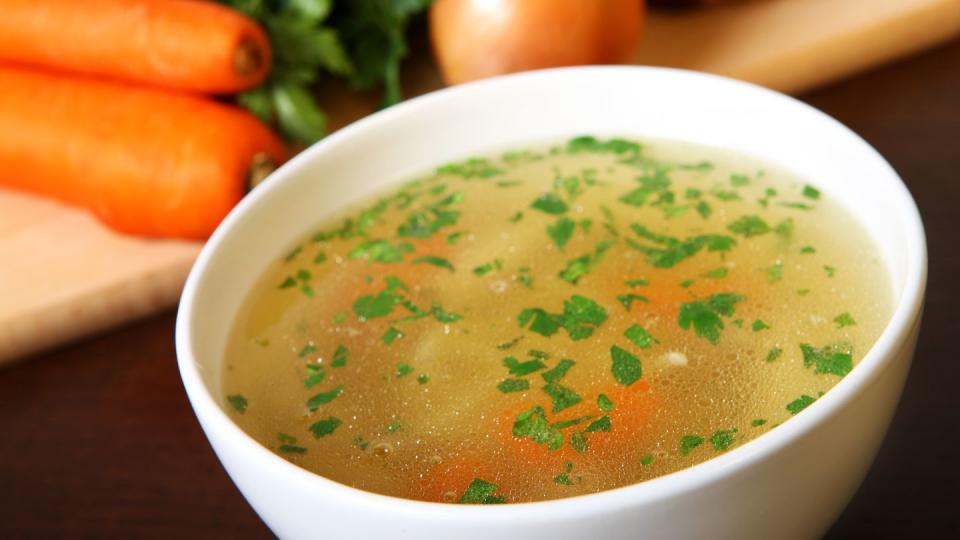
Gazpacho
Speaking of soups, tomato-based gazpacho deserves its own shoutout as it's brimming with water-rich veggies like tomatoes and bell peppers.
Add some watermelon and cucumber to your next batch of gazpacho, “both of which boast water contents exceeding 90%,” said Gillett.
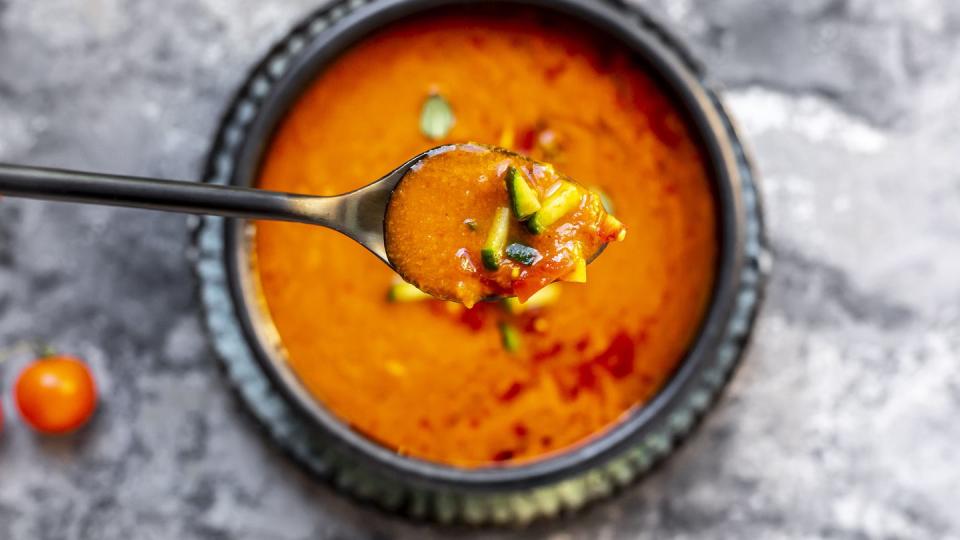
Spinach
That ever-popular dark leafy green is a boon for hydration, folks.
“Spinach may not be the first food that comes to mind when you think of hydration, but it contains around 91% water,” said Gillett. “Beyond hydration, spinach is a nutritional powerhouse, providing iron, folate, and vitamin K. Its high fiber content supports digestive health and helps control blood sugar levels.”
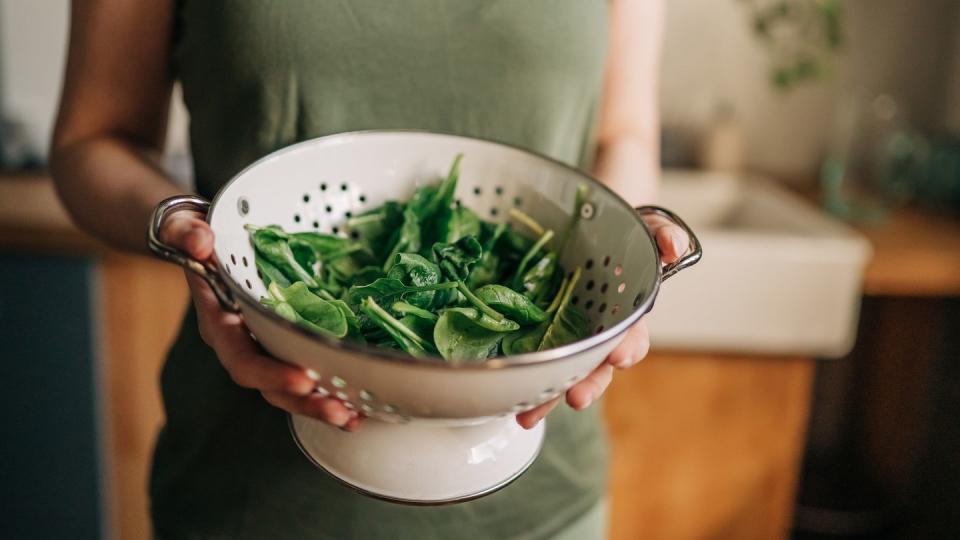
Strawberries
Gillett is also a fan of the juicy and sweet strawberry, which has a similar water content to spinach, clocking in at around 91%.
“They are rich in vitamin C, which supports skin health and boosts the immune system,” she said. Strawberries also provide antioxidants like anthocyanins, which have been associated with various health benefits.
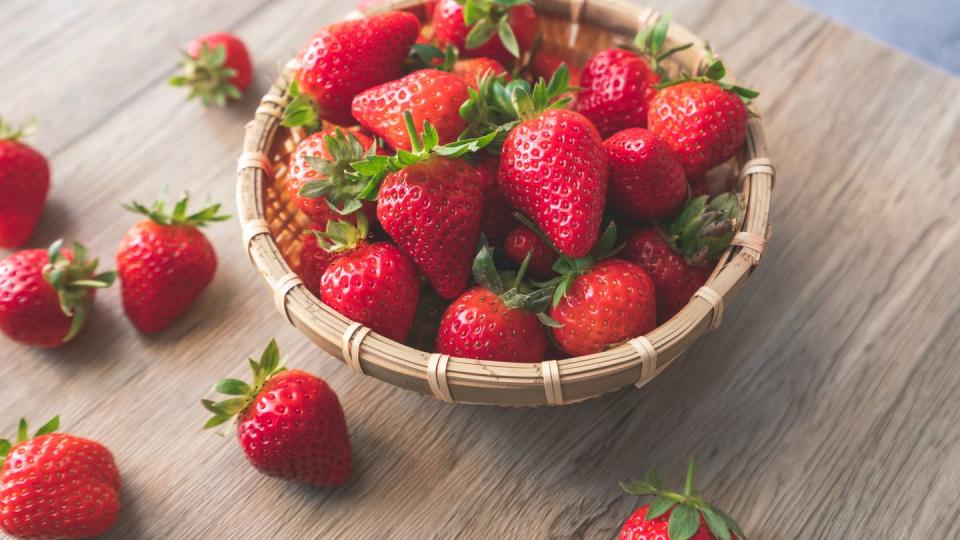
Zucchini
“Zucchini is a hydrating vegetable with about 95% water content,” said Gillett. This low-calorie veggie is a good source of vitamins A and C, as well as minerals like potassium and magnesium.
“Just keep in mind that you’ll get the most hydration benefit by consuming it raw, as cooking will cause some fluid loss,” she said.
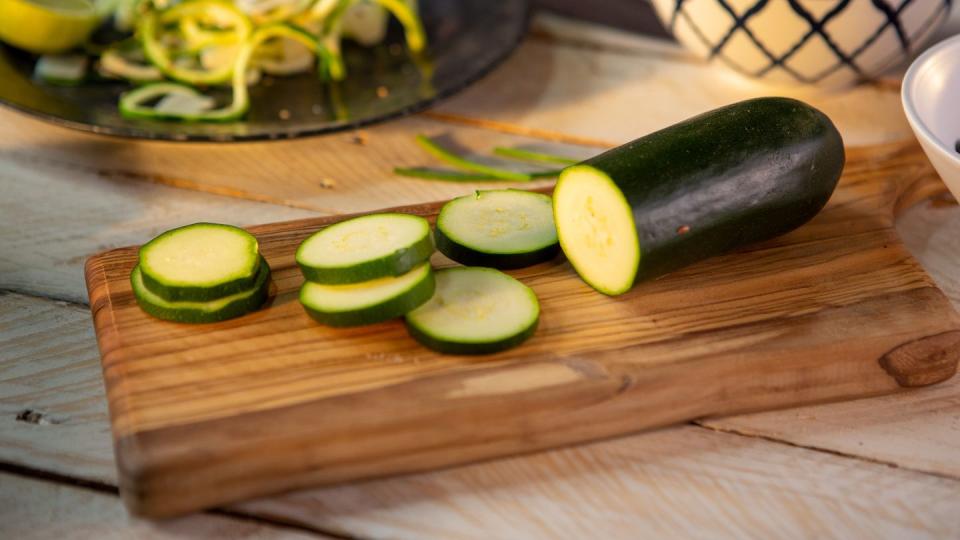
Yogurt
Here’s one more hydrating food you may not have thought of—this time in the dairy and dairy-alternative aisle.
“Yogurt can contribute to hydration, containing up to 80% water depending on the type,” said Gillett. “It also comes with the added benefits of protein, electrolytes like potassium and calcium, and probiotics that support gut health and nutrient absorption.”
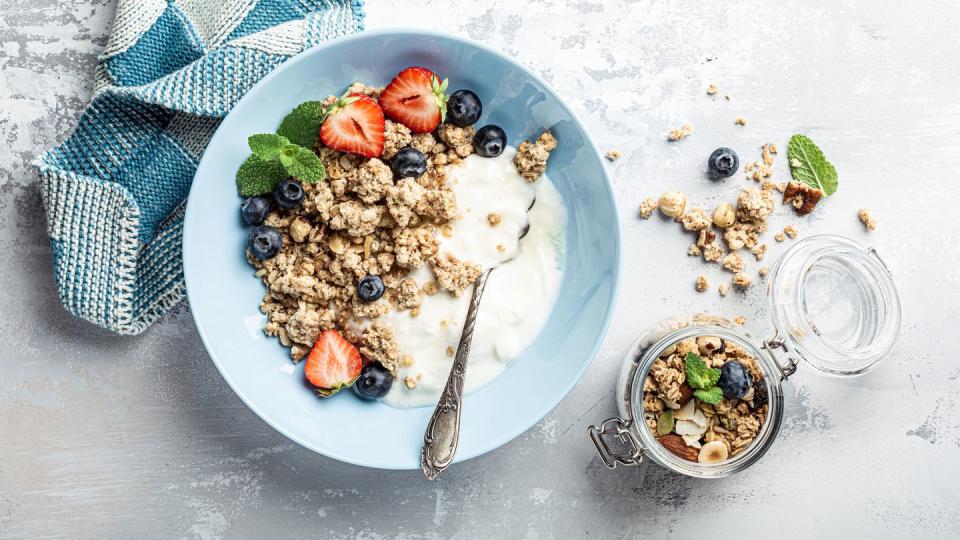
You Might Also Like

